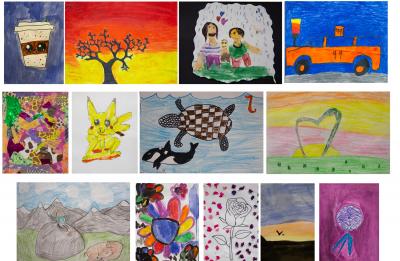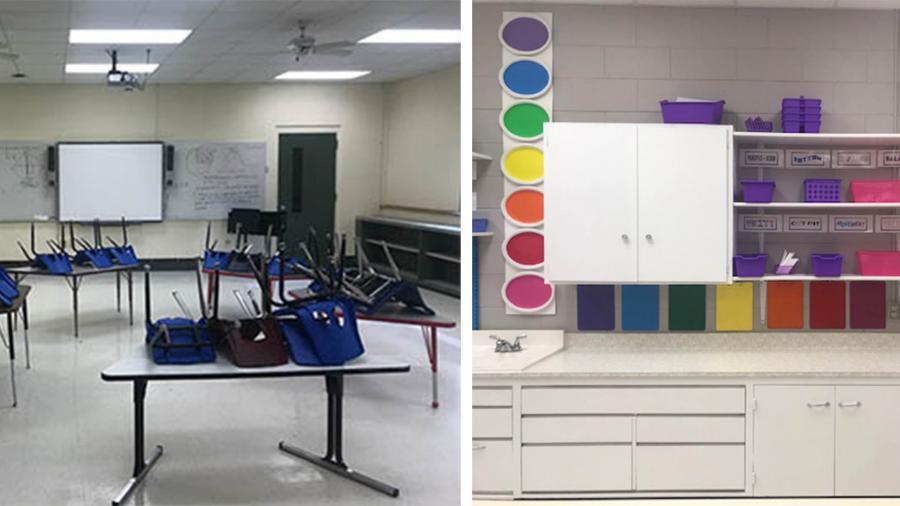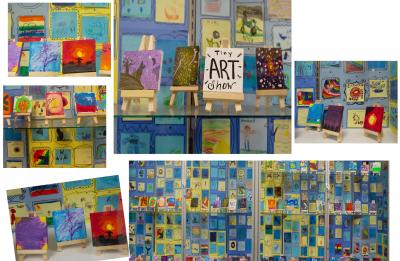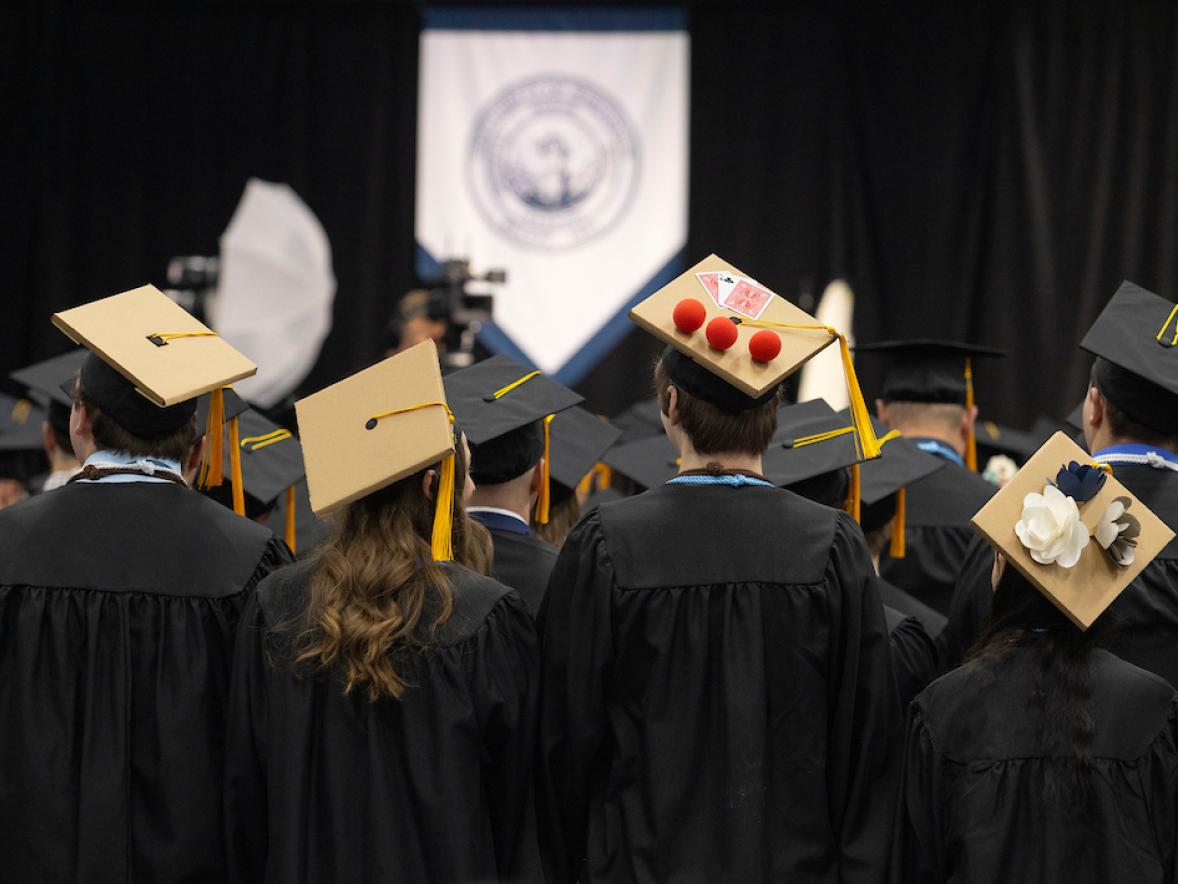Haylee Rognholt has a deep love for art that stems back to before she can remember. Her mom is a professional photographer, and both her grandmothers are painters. Growing up surrounded by artistic women, Rognholt’s creativity bloomed.
Rognholt dreamed of becoming an artist, wanting only art supplies for her birthday or holiday gifts. She also loved school and helping others and often thought of becoming a teacher.
“It wasn’t until my junior year of high school where I put the two together and started talking about wanting to be an art teacher,” Rognholt said.

Taking the long way around
But when Rognholt began her college career at UW-Stout, she swayed away from Art Education. She was persuaded by people’s negative comments on the education field and by her fear of public speaking.
Rognholt pursued her Studio Arts degree instead. Her photography experience grew with two internships; one with a commercial photographer and another with University Athletics.
Rognholt also worked at the childcare center on campus.
“The highlight of my day was always going to work with the kids,” Rognholt said. “I liked my art and photography classes and my internships, but I loved working with children.”
After graduating with her Studio Arts degree, Rognholt immediately returned to school to earn her second degree in Art Education.
“I think I was more mature and confident in myself, which made it easier to chase my dream, even if it was scary,” Rognholt said.
Finding her own way of teaching
Rognholt’s art education classes with Professor Ann Oberding gave her a base of knowledge on lesson planning, assessment, and different art education philosophies. And although she struggled at first, her hands-on experiences in her observations and student teaching helped build her confidence.
Professor Oberding called Rognholt a stellar student and self-advocate.
“Haylee asked questions for her continued learning both of art content, as well as in teaching,” Professor Oberding said. “Haylee was very personable and developed her teaching style as she moved through the program, passing the edTPA assessment prior to student teaching.”
Rognholt’s practicum hours were at South Middle School in Eau Claire and Ellsworth Elementary. She also taught family paint classes with Arts Integration Menomonie and art classes at the Boys and Girls Club.
What really prepared Rognholt to become an art teacher was her student teaching experience at Doudna Elementary in Richland Center, WI, with Mary Ann Rothering. Ms. Rothering asked Rognholt on her very first day to demonstrate watercolors to her fifth graders.
“It made me feel trusted and comfortable in her classroom right away,” Rognholt said.
Ms. Rothering continued to give Rognholt opportunities to teach on her own, eventually giving her all of her classes for about five weeks. Ms. Rothering even helped Rognholt rearrange her classroom to accommodate Rognholt’s style of teaching.
“I had never hosted a student teacher before,” Ms. Rothering said. “But after my experience with Haylee, I wish I had taken the opportunity much sooner in my career.”
“Haylee infused energy and new ideas into my classroom that sparked not only the students' interest but mine as well,” Ms. Rothering added. “Haylee’s implementation of TAB based art has changed my entire art pedagogy. Our time teaching together was a positive growth experience for both of us.”

Her philosophy of teaching
Rognholt is now in her first year of teaching art at Winskill Elementary School in Lancaster, WI. She doesn’t teach particular projects, but rather follows a philosophy called Teaching for Artistic Behavior, or TAB.
Through TAB, Rognholt leads lessons on idea generation, techniques, new materials, and artists. Rognholt challenges her students to come up with ideas for projects, so each student is working on a different art project than their classmates.
“Everything the students are doing is unique and awesome in their own way!” Rognholt said.
The TAB philosophy allows Rognholt the flexibility to work one-on-one with her students. Together, she can focus with a student on the particular skill they want to learn. She believes allowing her students to tailor their learning to their interests encourages them to be more engaged and take pride in their work.
Rognholt’s advice for future art teachers is to offer their students as many choices as possible; to know what it is they want to teach their students and to open it up for their students to bring in ideas.
“It may seem scary at first to let the students make a lot of choices, but they really end up surprising you!” Rognholt said.

Favorite teaching moment
Rognholt has many favorite teaching moments in her first year so far. But one moment stands out above the rest.
One of her fourth-graders is interested in drawing figures and faces. But he was lacking confidence and was frustrated. So, Rognholt held one-on-one art lessons with him, learning to draw Spiderman. As she drew on her paper, he drew on his, following her step by step.
He continued to get frustrated with his mistakes. But Rognholt showed him how she adjusted her drawing with the mistakes she made, too. She told him; her trick was she never gives up. She keeps drawing and fixing until she likes it.
“The very next day, he ran into my classroom with so much excitement saying, ‘Ms. Rognholt! I drew a person last night all by myself. I used all the tricks and tips you gave me, and it looks so good! I am going to keep working on it at home and bring it in when I’m done to show you!’” Rognholt said.
“This was a perfect teaching moment for me that keeps me going every day to continue building that confidence and pride in more students,” Rognholt said.
Rognholt’s goal is to inspire her students and to help them believe in themselves and their talent. But she finds inspiration in her students’ art, as well.
“My favorite artists are my students,” Rognholt said. “Their creativity and enthusiasm drive me to keep growing as an artist and as a teacher. I am in awe every day with their awesome ideas, positive energy, and their excitement for art.”
What makes a great elementary art teacher?
Rognholt is a very patient person, and working with elementary students takes a lot of patience.
“Patience is an even more important quality to have as an elementary art teacher, especially when you’re constantly working with messy material like paints and clay,” Rognholt said.
Rognholt’s enthusiasm for working with the kids also makes her a successful art teacher. Her students know she enjoys spending time with them, which she feels makes them more respectful of her.
But most importantly, Rognholt’s passion makes her a great art teacher.
“It is my passion for working with children and helping them be creative and build confidence in themselves that keeps me constantly trying to be better, for them,” Rognholt said.





